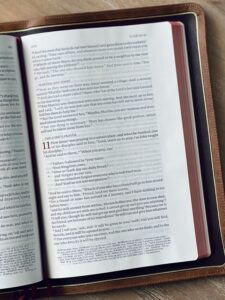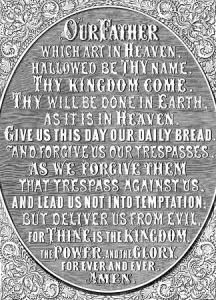Deconstructing The Lord’s Prayer

On Sundays, The Lord’s Prayer is recited in thousands of churches around the world. But according to Bill Johnson of Bethel Church in Redding California, the vast majority of churches and individuals have misunderstood what they are praying for and have been getting it wrong from the time of the early church. In his book, When Heaven Invades Earth, Johnson said, “The Lord’s Model Prayer provides the clearest instruction on how we bring the reality of His world into this one.” If Johnson is right, namely that the Lord’s Prayer provides clear instruction on how to bring the reality of heaven into this one, how is it that Christians have misunderstood it for centuries?
As we will see, Johnson is not merely giving us an alternate way of meditating on a well-known Christian prayer. He systematically deconstructs the prayer and how it has been traditionally understood by the Church and imposes his theological worldview upon it. In the end, it has a radically different meaning and significance than when one of Jesus’ disciples asked him to teach them to pray (Luke 11:1-4; Matthew 6:9-13). So, let’s see what Johnson says it means when, according to him, we pray it correctly.
In chapter six of Reckless Christianity, Holly Pivec and Doug Geivett said Bill Johnson thought the Lord’s Prayer was not a type of petitionary prayer, as it has been traditionally viewed. Rather, it is what can be called declaratory or “binding and loosing” prayer, meaning that Christians have God’s authority “to bind (or halt) all forms of evil in their tracks and to loose (or release) the blessings of heaven.” This understanding means the Lord’s Prayer teaches believers “to use binding and loosing prayer to establish God’s earthly kingdom, here and now.” Bringing heaven to earth, under the leadership of apostles and prophets, is a believer’s “greatest commission.” Pivec and Geivett quoted Johnson in The Supernatural Power, where he said: “when we pray, ‘Thy kingdom come, Thy will be done,’ we’re praying for the King’s dominion and will to be realized right here, right now.”
Pivec and Geivett noted in a footnote how Johnson’s theology here aligned with a version of dominion theology called “kingdom now” theology. “This theology describes the way the church is to establish God’s kingdom, namely by implementing divine strategies that have been revealed by present-day apostles and prophets for this purpose. Thus, the church must yield to the authority of these present-day apostles and prophets for this purpose.”
Supposedly, what is free to operate in Heaven (joy, peace, wisdom, health, wholeness, etc.) is “loosed” on earth. And what is not free in Heaven (sickness, disease, spiritual bondage, and sin) is “bound” here. “We are out to destroy the works of the devil.” Here is a brief YouTube video, “Bill Johnson and Gandalf’s staff,” of Bill Johnson and other “apostles” binding and declaring an end to racism. In When Heaven Invades Earth, Johnson said the Lord’s Model Prayer “reveals the only two real priorities of prayer. First, intimacy with God that is expressed in worship—holy is your name. And second, to bring His Kingdom to earth, establishing His dominion over the needs of mankind—Your Kingdom Come.”
Following the teaching within Word of Faith movement, Johnson says that believers can exercise the authority to bind and loose through their spoken words. He claimed this was “the primary focus of all prayer—if it exists in heaven, it is to be loosed on earth.” He dangerously affirmed that since humans were made in God’s image, and God spoke worlds into being, we can too. According Johnson, these “declarations” or “decrees” must be spoken out loud. In God Is Good, he said: “The decree itself is important because some things don’t manifest until they are spoken.” And making declarations was a critical practice for the church, according to Johnson, because God has limited himself to acting in response to declarations. Johnson said: “Nothing happens in the Kingdom until first there is a declaration.”
This sounds disturbingly like he is saying nothing happens in the Kingdom until an incantation is verbalized. In the Genesis one creation account, God did speak things into existence. However, that was the creative power through the spoken word of God alone. “In the beginning, God created the heavens and the earth” (Genesis 1:1). He created the great sea creatures and every living creature (1:21) and He created mankind (1:27). In all of those cases, “create” in Hebrew is a word reserved for God’s creative activity alone. When God said let there be light (1:3), let there be an expanse (1:6), let dry land appear (1:9), let the earth sprout vegetation (1:11), he was not binding and loosing. He separated the lights in the expanse (1:14), let the waters swarm with living creatures and birds fly (1:20), and brought forth living creatures according to their kind (1:24), he was exercising His exclusive creative powers. Creating though the spoken Word is an act of God alone (John 1:1-3).
Binding and Loosing Prayer
In When Heaven Invades Earth, Johnson parsed the Lord’s Prayer in Matthew 6:9-13 and then proceeded to describe how it called believers to exercise their authority in binding and loosening prayer. After quoting “Your kingdom come, your will be done, on earth as it is in heaven,” Johnson said:
This is the primary focus for all prayer—if it exists in heaven, it is to be loosed on earth. It’s the praying Christian who looses heaven’s expression here. . . Everything that happens here is supposed to be a shadow of heaven. . . Conversely, if it is not free to exist in heaven, it must be bound here.
Bill Johnson then quoted Matthew 16:19 from the NAS in support of binding and loosing prayer: “I will give you the keys of the kingdom of heaven; and whatever you bind on earth shall have been bound in heaven, and whatever you loose on earth shall have been loosed in heaven.” He called the reader’s attention to the verb tense of “shall have been” and said, “The implication is that we can bind or loose here what has already been bound or loosed there. Once again, heaven is our model.”
However, it does not seem the passage supports his assertion. Peter had just declared that Jesus was the Christ, the Son of the living God in verse 16:16. Then Jesus said his confession was not revealed to him by flesh and blood, “but my Father who is in heaven”:
And I tell you, you are Peter, and on this rock I will build my church, and the gates of hell shall not prevail against it. I will give you the keys of the kingdom of heaven, and whatever you bind on earth shall be bound in heaven, and whatever you loose on earth shall be loosed in heaven” (Matthew 16:18-19, ESV).
In his commentary on Matthew, Leon Morris said Peter will be given the keys of the kingdom of heaven because of his confession that Jesus was the Christ, which was revealed to him by the Father (16:17). Then in Matthew 18:18, the right to bind and loose, connected with the gift of the keys, was given to the disciples as a whole. Morris said the metaphor of binding and loosing was used by the rabbis for declaring what was forbidden or permitted, ‘to impose and remove the ban.’ Morris went on to note we must be guarded in our understanding of the passage, because there are several possibilities. “But on the whole it seems that the right to ‘bind’ and loose’ refers to the regulation of conduct, while the keys point to admission and exclusion [to the Christian community].”
Craig Keener said in his commentary on Matthew that while scholars have proposed many interpretations of “binding and loosing,” these terms could refer to authority to interpret the law, and thus evaluate an individual’s faithfulness to the law. Keener further said:
Peter must thus accept into the church only those who share his confession of Jesus’ true identity (16:16). Of course, the church should emulate Jesus’ practice of welcoming the unconverted (9:10), but this is not the same as acting as if all comers were true disciples of Christ regardless of their commitment. Today some churches both admit into membership the unconverted and fail to take the message of Jesus’ identity to the unconverted outside their walls. The danger of building a church on those not committed to Christ’s agendas is that in time the church will reflect more of the world’s values than Christ’s.
There is another passage in Matthew 18:18 where the context clearly supports binding and loosing as referring to the regulation of conduct within the earthly church and cannot be understood as bringing what exists in heaven to the earth. Jesus is advising in Matthew 18:15-19 on how to address a brother who has sinned against you. Leon Morris noted where the verbs for binding and loosing in Matthew 18:18 are also future perfect: “Truly I say to you, whatever you bind on earth shall be bound in heaven, and whatever you loose on earth shall be loosed in heaven.”
Keener said bind and loose in the passage referred to the judicial authority of gathered Christians to decide cases on the basis of God’s law within church discipline. He said the more popular use of “binding” today applies to exercising authority over the devil, and “resembles an ancient practice in the magical papyri,” which is also called “binding.” In “What does the Bible mean by binding and loosing?”, Got Questions said essentially the same thing. This raises a question about the biblical credibility of Johnson’s application of binding and loosing to the Lord’s Prayer.
It seems that “binding and loosing” in Matthew 16:18-19 and 18:18 refers to having the authority to confirm who is or is not part of the church as result of whether they confess that Jesus is the Christ—that he is Lord (Romans 10:9-10)—and not the authority to bind or forbid the works of Satan and loose heaven on earth.
In Reckless Christianity Pivec and Geivett said the teachings on binding and loosing originated with the prosperity gospel/Word of Faith movement, and were adopted by Bill Johnson and others in the NAR. Accordingly, believers have been given the spiritual authority “to bind (or forbid) the works of Satan, including sickness, addictions, fear,” etc. They have also been given the authority “to loose (or permit) God’s blessings, including health, peace of mind, strong marriages, successful businesses, and abundant finances.”
Johnson’s understanding of “binding and loosing” prayer also seems loosely based on a pentecostal theology of the spiritual gifts. In Foundations of Pentecostal Theology, Guy Duffield said Jesus instructed his followers to wait until they are “clothed with power from on high” (Luke 24:29). The promise was fulfilled on the day of Pentecost when they “began to speak in the tongues predicted in The Great Commission.” Duffield said the Apostles were not just mere guardians of orthodoxy; “they were ambassadors of Christ equipped with Divine capabilities.” They had a divine commission to do, and now had the power to do it. Duffield said:
They had a Divine work to do and they had Divine power with which to do it; thus, it must always be. The Church’s mission is much more than propagating a new philosophy or calling to a new morality; it is delivering men from the bondage of Satan; it is binding and loosing in the name of Jesus (Mt. 16:19).
Bill Johnson appears to impose his belief in binding and loosing prayer onto the text of the Lord’s Prayer, giving it a theological meaning that is antithetical to what Jesus taught his disciples about prayer. Read “A Crafty Angle on Declarative Prayer” by the Lovesick Scribe, who was once “a proverbial card carrying, Satan binding, tongue talking, declaring prayer warrior” who “had no idea how Biblically illiterate” she was.
This article was heavily influenced by the research and thought of Holly Pivec and R. Douglas Geivett and their books, Reckless Christianity, A New Apostolic Reformation? and Counterfeit Kingdom. For more critique of When Heaven Invades Earth, see “Does Jesus Have a Multiple Personality Disorder?”, coming soon.



